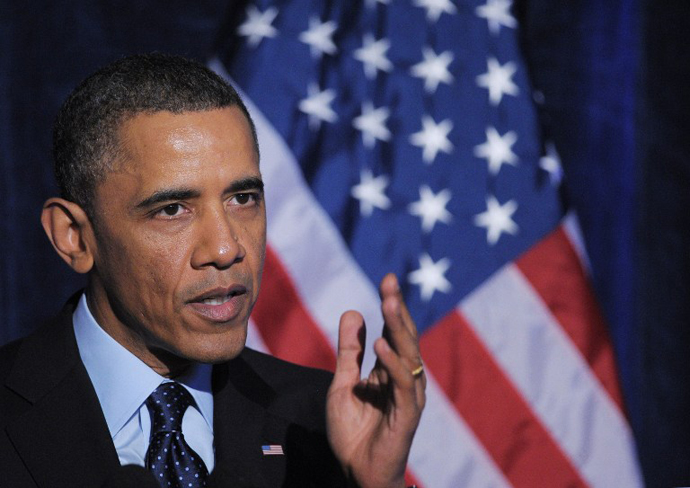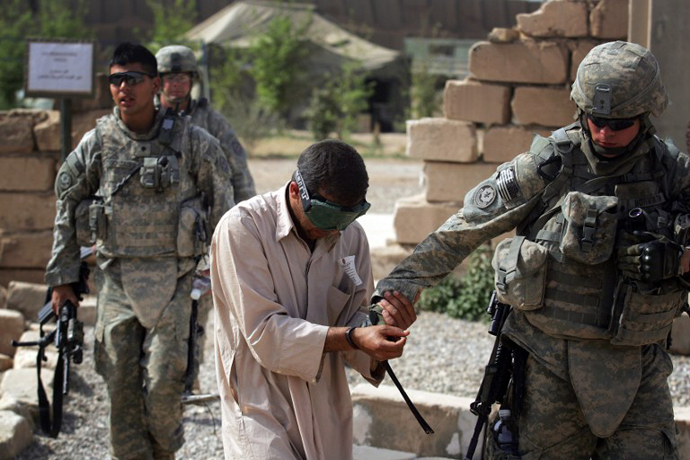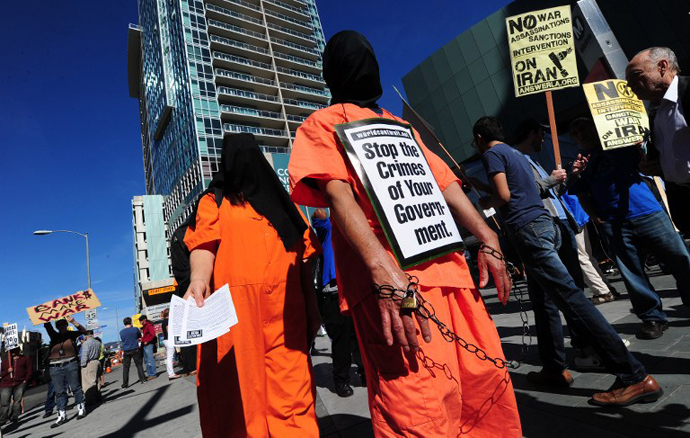‘Gitmo prisoners feel they are in a living tomb’
There is a palpable sense of despair amongst the Guantanamo Bay prisoners, both those who years ago had been told they would be released and those who were designated for indefinite detention, investigative journalist Andy Worthington told RT.
RT:Some inmates are said to be so sick, they're coughing up blood. Others are being hospitalized and force-fed. How bad is this hunger strike getting do you think?
Andy Worthington: Well, it sound very bad and the problem
that we have is that on one hand we have the lawyers for the men
talking about how over 100 out of remaining 166 men are on a hunger
strike and this strike started last month. And on the other hand we
have the Obama administration apparently claiming that there is not
very much going on. So, that is not helping us to get any clarity,
but of course that has always been the problem with Guantanamo,
that this is a very opaque facility. However much the
administration, first of all Bush and now Obama has tried to
pretend that they are open about what is happening there. And that
isn’t true.
And really, there’s an enormous sense of despair amongst the
Guantanamo prisoners. We’ve got over half the men who were told
years ago that they were going to be released, who are still held.
We’ve got other men who were designated for indefinite detention,
which is a terrible thing anyway. But Obama issued an executive
order authorizing that, but promising that their cases to be
reviewed. And they haven’t had their cases reviewed. The men there
must feel like they’re just in a living tomb.
RT:What will this hunger strike achieve?
AW: Well it is already achieving, I imagine part of what
the purpose is, is to let the outside world know, that it is not
acceptable for these men to be held forever with nobody making any
moves to release them, even though, as I say, more than half of
them have been cleared for release, but they have been forgotten.
And they have primarily been forgotten by the United States
government, by the United States media, and by the American people.
And that it is really not acceptable.
So we are talking about it here, but I’ve noticed that it is filtering out gradually into the mainstream media and is getting the issue discussed. Because clearly the situation that we had for some time now is that President Obama can’t really be bothered to overcome the opposition in Congress, can’t really be bothered to try and secure a decent legacy for himself by revisiting his failed promise to close the prison. Everyone has forgotten about it.

RT:But what about the issue of human rights? Isn’t that a concern for President Obama?
AW: Well it should be of concern. The President claims
that the legislation passed under Bush, just after the 9/11 attacks
authorizes the detention of prisoners and that therefore it is
acceptable for these men to be held. But it isn’t acceptable.
These are still men who aren’t held either as prisoners of war
according to the Geneva Convention or as criminal suspects who are
going to face a trial. Nearly all of them there in Guantanamo are
effectively still held as enemy combatants. The Bush
administration’s plan was to hold people forever without ever being
to justify objectively why they were being held.
RT:The US maintains that intelligence gathered at
Guantanamo saved American lives. Isn't that a strong case for
keeping the prison open?
AW: No. I think this is nonsense. The United States
authorities have never officially claimed that any more than a few
dozen of the people that they held were people with any connection
to terrorism. There has been no evidence provided that the torture
of prisoners led to any information that actually foiled terrorist
attacks.

What they are left here with is a problem of mostly of detaining
people either who have been horribly abused throughout their eleven
years in custody. Primarily it is the opposition within Congress
and inactivity in the administration to clear up this terrible,
terrible mess that was left by the Bush administration.
And it is now Obama’s prison. It is very much a place where he is not doing anything about it. The people held there, as I say, the majority of them who are supposed to be released who are still being held. That is a terrible indictment the way President Obama is behaving. And it seems it is down to the prisoners to make the world aware of this situation.
RT:Will media coverage of this case spur President’s Obama’s decision?
AW: I hope so. What it needs is to be backed up by sustained reporting about this. And then I would hope for representatives of other governments to try and put pressure on the US. Maybe the home countries of the people who are being held at Guantanamo need to start putting more pressure on him.
As it stands, lawyers for the prisoners have been trying and go to the American Commission on Human Rights which does not have power in the United States, but at least it is a venue where they can raise these issues, because sadly the US is not answerable to anybody about its behavior. And I think what we’re seeing with Guantanamo is a problem that this is not an American problem that they did not want to have to deal with, because there isn’t internally in the United States enough political capital in it.

The statements, views and opinions expressed in this column are solely those of the author and do not necessarily represent those of RT.












